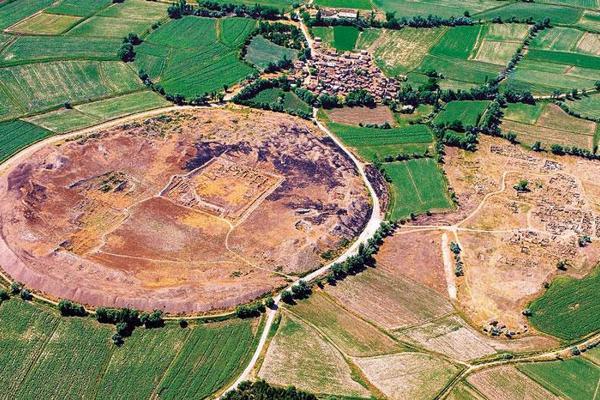Thousands of years ago, women were trading in Anatolia
KAYSERİ – Demirören News Agency


Historic documents unearthed during excavations in Anatolia’s oldest international trade center, Assyrian Trade colony Kaniş-Karum, have revealed that women made commercial deals and impressed their seal 4,000 years ago.
Programmatic and systematic excavations began in 1948 at the Kültepe ruins, the remnants of the first city founded by the Hittites in Anatolia, which are 24 kilometers away from the center and surrounded by Karum.
Cuneiform tablets from 4,000 ago show the role of women in social life in Anatolia. The first programed and systematic excavations in Kültepe, which is 24 kilometers into the highway between the Central Anatolian provinces of Kayseri-Sivas, started in 1948.
An important name in Anatolian archeology, Tahsin Özgüç headed the excavations for 55 years until his death in 2005.
Excavations at Kültepe are now headed by Fikri Kulakoğlu, a professor of Ankara University’s archaeology department.
So far 23,500 cuneiform tablets have been unearthed in the field along with 20,000 archaeological findings. This year’s works, which started on June 26 and ended last month, uncovered 76 artifacts, including two tablets and the corners of administrative structures which were built 4,000-4,500 years ago.
Kulakoğlu, in his article in the Kayseri Metropolitan Municipality’s magazine “Şehir,” says the cuneiform tablets shed light on the social life of Anatolian locals.
“In this age, equality between women and men constituted the essence of social life. Women found a place in this system of business and management. For example, the queen was the head of the state. Marriage and divorce agreements, proving the equality between men and women, were arranged on a mutual agreement basis. Married women made a deal on their names and impressed their seals on it. Many debt certificates were sealed by husband and wife. Whether married or single, women were involved in contractual and legal work,” he wrote.
First organized trade center
The center of the large trade colonies, established by the Assyrians, was Karum in Kültepe. The first written tablets in Anatolia were found in Kültepe, the first organized trade center in the world.
Among these Assyrian cuneiform tablets were letters, bills, seals and treaty texts revealing the political and legal relations of the traders, people, and rulers of the time.
Kültepe, which had a strategic importance on the trade route, has maintained this feature for hundreds of years.
Since this trade movement that started in Kültepe, Kayseri has been one of the most active trade cities in Turkey.
Kulakoğlu said the important position of women in Anatolia 4,000 years ago were revealed in cuneiform tablets and seals.
“Kültepe tablets clearly reveal the position and tasks of women both in family and economic activities 4,000 years ago in Anatolia and Mesopotamia. There are various texts revealing that women ruled the state with the kings,” Kulakoğlu added.
“The marriage and divorce documents we have also show that women and men had the equal rights in Anatolia. The Assyrians could marry native women of Anatolia. In this case they were forbidden to marry a second wife. However, it is noted that they may have had temporary marriages with women in Assyria. The equality between women and men in legal terms was already more apparent among Anatolian people,” he said.
